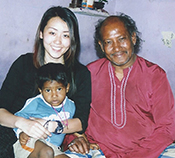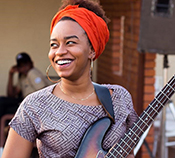Music is My Hope for Life.
(Part 1)
Ephraim Bugumba / Singer and songwriter
Music has always been a pivot of my being.
Ephraim Bugumba was born in the war-torn Democratic Republic of the Congo (DRC). Domestic ethnic conflicts forced his family to flee their country when Ephraim was only 3. His family moved between refugee camps in southern Africa for more than a decade. When Ephraim was 16, his family finally attained refugee status in the United States. The comfort and hope he drew from music sustained him through a nomadic childhood lived in refuge. Today he is starting a new life as a professional musician. He told us about his journeys through childhood.
Singing gospels with my family kept me alive.
I was born in Makobola, a village in the northeast of the Democratic Republic of the Congo. My parents led the choir at our local church. They filled our house with gospel music. When I was 3, our lives were shattered. Upwards of 500 people were killed in a massacre that broke out in our village at the hands of rebel soldiers. The village was destroyed and many of our neighbors perished. My family’s lineage was tied to Congolese monarchy, which made us potential targets. We had no choice but flee the village.
We crossed the border to hide in a dense forest, defenseless against the soldiers and wild animals nearby. The peril was extreme, a matter of life and death, especially for a child of three. My parents prayed for the protection of our lives through the night, unsure of when we would next find food to eat. Fate spared us that night, but our life on the run was to last for years. Music sustained us through our struggles and preserved our integrity as a family. Every night we sang gospel songs, read the Bible, and said grace together before going to sleep. Whenever we sang, I escaped my hardships and anxieties. Music was no longer just a fun diversion, but a source of inner peace. I needed to sing to keep on living.
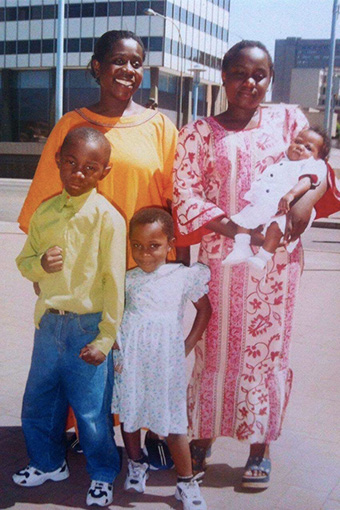
Music is culturally diverse, but fundamental human sentiments are at its core.
After leaving Congo, we moved from one refugee camp to another in neighboring countries. In every camp I discovered music rooted in the local culture – in Tanzania, in Malawi, in Mozambique. Music is a mirror that reflects what people in a community have gone through in their lives. Malawian music, for example, conveys powerful messages of freedom and liberation in an essentially reggae genre. From a different standpoint, music is universal. Music catches the imagination by expressing sentiments everyone feels – like love, or heartbreak, or happiness– in sounds and rhythms rooted in a culture, no matter the language or style. This is how I have come to see music through my journey.
After 7 years of wandering, we lived for a decade in South Africa. Able, once more, to go to church, I joined a choir. I practiced for many hours each week to keep up with the others in our group, who sang so beautifully. The church had a guitar with three missing strings. No one knew how to play that guitar, let alone tune it, but I got hold of it to see what I could do. In no time I was having great fun with the new instrument. I had discovered the joy of playing and singing music at church.
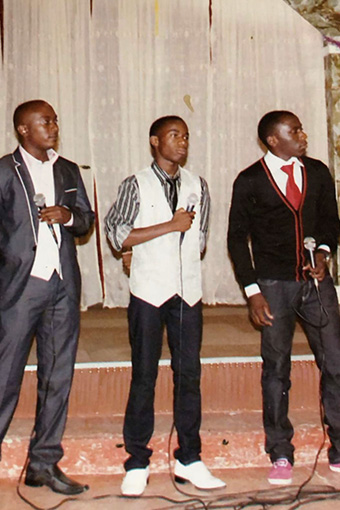
Choosing to become a musician against all odds.
In 2012 our application for asylum in the USA was finally approved, so we migrated to this country. On the brink of turning 16, I was thrilled about the new prospects in life. I especially remember the joy of having my own bed!
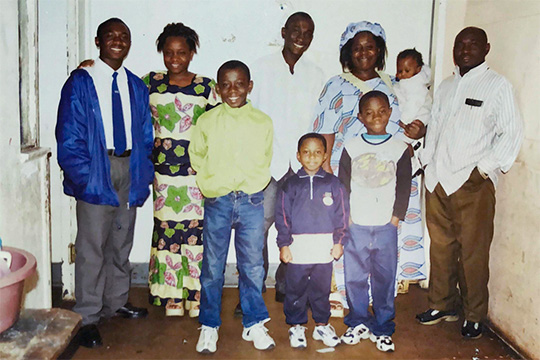
In 2015 I started studying at Lewis University with a major in music merchandising. Music was at the core of my studies, but I still had no plan to actually become a musician. I had a deep-rooted preconception, from my childhood in Africa, that a person must come from a wealthy background to succeed as a professional musician.
My football coach at university helped me overcome that kind of thinking. “If you want to be a musician,” he told me, “you’ll never be happy pursuing a business that only gives you stability.”
His words were a wakeup call. I left Lewis University to pursue music seriously. I applied for auditions and played my own compositions at local music venues. It was a difficult period without making a breakthrough, but one day I made it into the final rounds of “American Idol” as one of the top 50 contestants. That was a great validation: I knew I had made the right choice and was going about it the right way.
- Ephraim Bugumba / Singer and songwriter
- Born in 1996, Ephraim Bugumba spent the first three years of his life in the Democratic Republic of the Congo. In 1999, his family was forced to flee from their home in the village of Makobola to escape a historic massacre. For the next 14 years, Ephraim and his family moved from one refugee camp to another in southern Africa. In 2012, he and his family moved to the United States, and now they are permanent residents. Six years later, he finished as one of the Top 50 contestants of Season 16 of American Idol (2018). His original song, “Voices in My Head,” was widely acclaimed in NPR’s Tiny Desk Contest in 2019. Not long after, he won a Spirit of Folk Award at the 2019 International Folk Music Awards. Ephraim made his professional debut in the same year with his single, “Class Clown.” His latest album, “Stormz,” was released in June 2020.
Interview Date:


